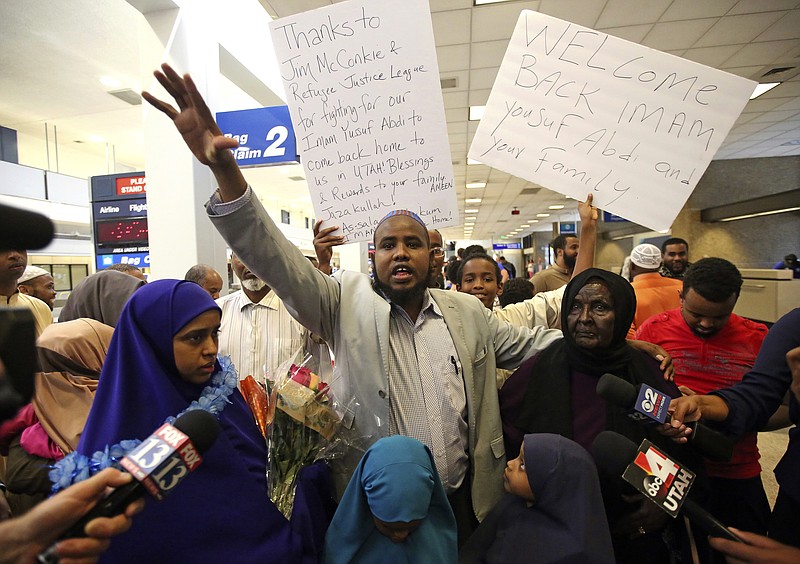SALT LAKE CITY (AP) - A Utah Muslim leader who finally returned home after being barred from flying to the U.S. last week will push forward with a lawsuit that brought attention to his case to ensure he is afforded free reign of travel in the future, his lead attorney said Monday.
Imam Yussuf Abdi, a U.S. citizen, and his attorneys believe his name is on a government no-fly list where he doesn't belong, lawyer Jim McConkie said.
In a lawsuit filed Friday, they argued he has no criminal record or reason to be on the no-fly list and demanded he be allowed to fly home. That happened Sunday after McConkie and his team of lawyers received help from federal prosecutors in Utah who intervened on his behalf, McConkie said.
Abdi was greeted by about 100 cheering supporters when he arrived. Abdi had gone to Kenya to bring back his wife and five children, who had been waiting on their visas to be approved. He is the imam of Salt Lake City's Madina Masjid Islamic Center.
Abdi is a well-known member of the Utah inter-faith community, McConkie said. He needs travel clearance soon because he is scheduled to lead a religious pilgrimage to Saudi Arabia in August, McConkie said.
Spokeswomen for the FBI and U.S. Customs and Border Protection agencies declined to comment on the case, saying the agencies do not comment on pending legal matters.
Melodie Rydalch, a spokeswoman for the U.S. Attorney's Office in Utah, said her office coordinated with other federal agencies including the Department of Homeland Security to help Abdi return to Utah. She declined to provide more details because of the pending legal case.
McConkie said he was in touch with contacts at the U.S. Attorney's Office all weekend, asking for help each time Abdi had more trouble. "Whatever they were doing, we are grateful," McConkie said.
The no-fly list decides who is barred from flying at U.S. airports. It contains thousands of names and has been one of the government's most well-known counterterrorism tools since 9/11. It also has been one of the most criticized, with opponents saying some innocent travelers have been mistaken for terrorism suspects.
Abdi, who has lived in Utah for six years, said at the airport that he was happy to be home and trying to focus on those who helped him get back rather than being frustrated by those who tried to keep him from coming.
The lawsuit alleges that Abdi was added to a watch list in 2014 that let him fly but required extra security measures. His formally asked Homeland Security to take him off the list last year, but nothing changed.
Abdi's travel woes come during the same year that President Donald Trump tried to enact a travel ban restricting travel from Muslim-majority countries. Two versions of the travel ban have been put on hold by federal courts.
As a candidate, Trump pledged to block Muslims from traveling to the United States until American authorities could get a better handle on vetting visitors and immigrants. Those campaign remarks have been used as evidence of his intention by opponents of the order.
"This is just amazing to me that this could happen to a citizen," McConkie said. "He (Abdi) has a constitutional right to travel."
